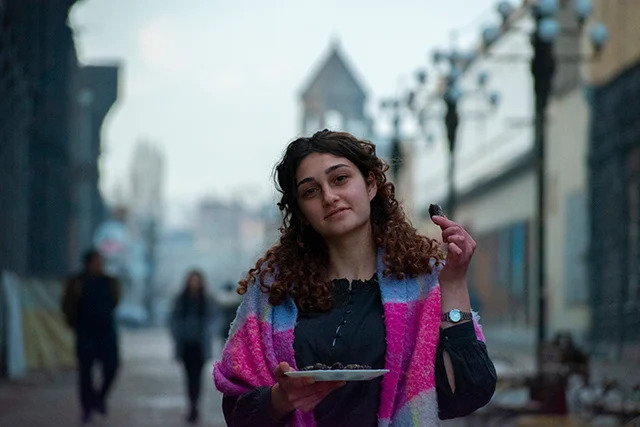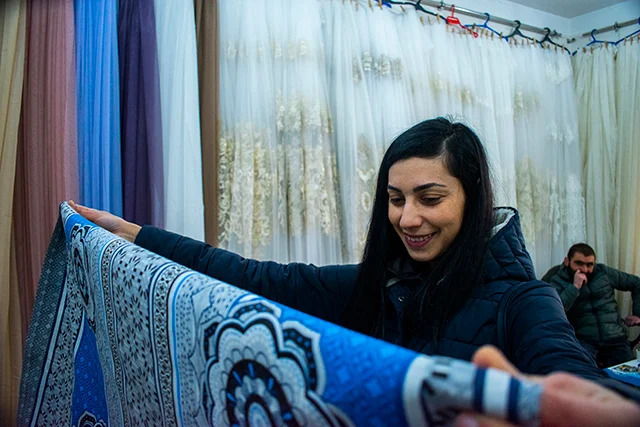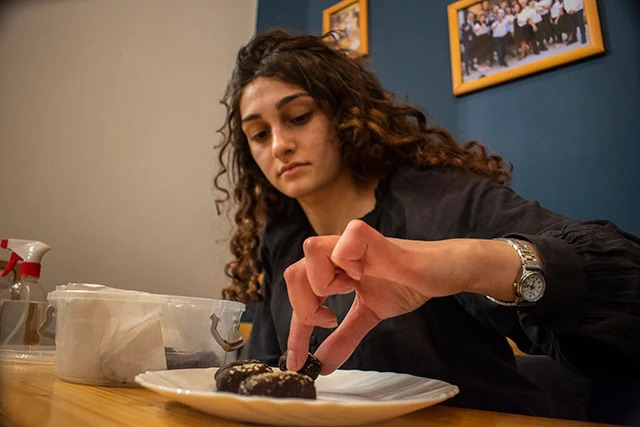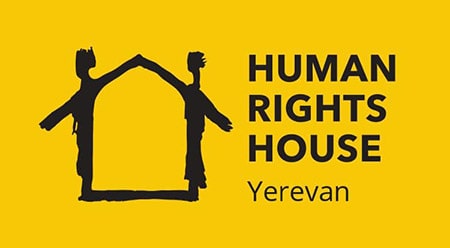
Shirak region is considered to be the poorest in Armenia. It’s not easy to find a job here, and the COVID-19 pandemic has made the situation even worse. A number of businesses have closed, vacancies have all but disappeared, and finding a job has become almost impossible.
The European Union (EU) is implementing a number of initiatives in the region. One of them, ‘COVID19: Civil Society Resilience and Sustainability’, began in 2020 and will last until 2024. The project is implemented by two NGOs, ERIM (Equal Rights and Independent Media) and Human Rights House Yerevan. It aims to support civil society organisations in overcoming the challenges of COVID-19 and development. Armenia received €527,000 in the framework of the project, €400,000 of which will be distributed as a sub-grant. The Women’s Rights House NGO in Gyumri is one of the beneficiaries of this project, and it got the opportunity to continue its activities thanks to the project.
As part of the ‘COVID-19 Response Through Women Entrepreneurship’ project, the NGO has set up a group of 30 women and girls who have certain skills, such as handcrafting, sewing and cooking. Thirteen business projects were selected among 30 women, receiving grants of up to 700,000 AMD.
Family traditions help to create new jobs
Gohar Hovhannisyan, 28, is studying for a master’s degree at the Faculty of Iranian Studies at Yerevan State University, but she returned to Gyumri when classes went online due to the COVID-19 pandemic. Back home, where her mother had lost her job due to the pandemic, Gohar decided she had to look for work. After looking around, Gohar found out about the initiative and decided to apply.
She easily chose her business direction – sewing – which is a family craft: Gohar’s mother has been sewing for years and taught her to sew as well: “There were very large garment factories in Gyumri. The older generation of women is mainly specialised in that field. And it is passed on to the next generation. I hope it will be transmitted continuously, and will not be lost.”

The initiative includes not only the family: Gohar and her mother were joined by her friend, Tamara, and her mother, with the two mothers bringing their experience, and providing advice and help to the young women start their business. Gohar plans to sew bedding and sell her work in Gyumri and Ashotsk. If successful, they intend to expand the practice into a remote sewing workshop, where local women will have the opportunity to work from home.
“This is my first attempt. I would never think that I could start a business, but circumstances made me consider it,” says Gohar, noting that she loves her profession and is going to strike a balance between her business and Iranian studies.
Under the project, mentors work with women to help them explore the market, develop strategies, and to provide advisory support. The project will last for six months. It has a budget of 650,000 AMD, which Gohar will to use to buy materials and sewing machines.
They will do the work from home remotely. Gohar hopes that during the project they will manage to sell their products in such a way that after the end of the project they will be able to self-finance and further expand, not only their staff, but also the market.
One master is enough for the production of one item of bedding: “We are able to produce one set of three pieces a day, but for the start it is a lot. We now plan to produce 14 sets until we understand how much we can sell. Then we will gradually increase the production.”
Tasty and useful
Anjela Dzvakeryan, 19, studies at Shirak State University. She hopes to become a social worker and has volunteered in several initiatives. She thinks that if you have the determination, it is possible to find a job in Gyumri, even during the pandemic, but finding work in a specific profession is not so easy.
Anjela lost her job during the pandemic, applied for various positions, but in vain. Hearing about the initiative, she decided to create her own small business producing chocolates.
“I applied, but didn’t have enough competences in this field. But I had the general idea, and wanted to develop it,” says Anjela, noting that she participated in a two-month training within the framework of the project, which helped her to develop knowledge and skills. During that period, the mentors assisted her in clarifying her idea and developing the project.

For Anjela, it is important that the ingredients in the chocolate she produces are natural and low in sugar. In particular, she uses palm and dark chocolate: “I have a sweet tooth and at the same time I advocate a healthy lifestyle. I like to eat in a healthy and beautiful manner. And the idea arose to combine the two – to produce a chocolate, which is both sweet and is not harmful, and will satisfy the need for sweets.”
Anjela finds the recipes on the Internet, but does not simply recreate them. She spends hours in the kitchen experimenting and tweaking, after which she develops her own recipe: “I do all the work myself based on my taste. You can say that you can’t find these chocolates in any other place.” Anjela has planned a 500,000 AMD budget for the project, with which she is going to buy the equipment and accessories necessary to produce the chocolate. Initially, the production will be organised at home, then, if the project succeeds, Anjela plans to expand her small business. The main work will be done by Anjela, but her family will support her initiative.
Studying the market, Anjela realised that there are similar chocolate productions in the capital Yerevan, but the market in Gyumri is free, and she is one of the first to have the idea. However, she does plan to sell her chocolates to Yerevan in the future: “There is such a demand in Gyumri. I have made inquiries on different platforms, and people are ready to buy chocolates here.”
Despite her youth, Anjela tries to do all the work alone, though sometimes her future partners are sceptical about her age. However, she doesn’t get discouraged and doesn’t stop trying.
If the project is successful, she plans to open a store and create new jobs in Gyumri within a year. “It is very binding, but I must do my best for the project to succeed and to reach my final goal.”
These two young women, with the support of the European Union, are trying to take their first steps in business, despite the crisis caused by the COVID-19 pandemic. If successful, both initiatives will create new jobs in the Shirak region. In their turn, they will contribute to the reduction of poverty in the area and the creation of new employment opportunities.
Author: Ami Chichakyan
Article: aravot.am


